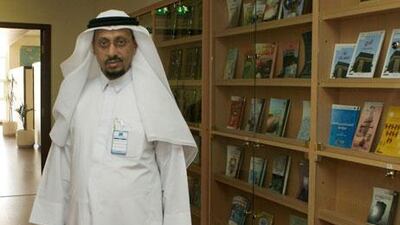DUBAI // The Grand Mufti of Dubai has warned against reading unauthorised translations of the Quran after a Texas man released an English translation online.
"Translations of the holy texts must be approved by a specialised committee," said Dr Ahmad Abdulaziz Al Haddad, Grand Mufti and head of the Fatwa department at the Islamic Affairs body in Dubai.
The translation in question, ClearQuran.com, is the work of Talal Itani who has been working on the project for four years.
Mr Itani, 52, a Lebanese-American, created the website and published his translation of the Quran in May last year. He also offers printed, e-book, and audio versions.
"I would wake up at 4am every day and work on the translation. I would translate, and retranslate, until I was completely satisfied. Everything was very important: sentence structure, choice of words, flow, punctuation, accuracy, clarity, ease of use, closeness to the Arabic."
He wanted the new translation to be as good for a scholar to read as it would a prison inmate. "Most importantly, it should be good for my 19-year-old daughter to read."
Itani has a masters in Electrical Engineering and started a successful company, but found life unfulfilling until he reconnected with his faith.
"The Quran gave me so much, and I wanted more. It gave me purpose, and satisfaction, and fulfilment, and strength, and clarity. I naturally felt the need to convey the Quran to others, especially to the people around me." Speaking with some compassion, Dr Al Haddad told The National he understood Mr Itani's motivation. "This man might have good intentions but he is committing a grievous error, and it may be a big problem," he said.
Translating the Quran is no easy task, he added. "You are not transliterating or taking the verses on face value. You would be misleading many people by doing that. You have to understand that the Quran itself is a miracle - there is immense knowledge within these words."
Dr Al Haddad said there were three main criteria for an accurate translation of the Quran.
"Firstly, you must have a clear understanding of each verse in Arabic, and know the meaning behind it.
"Secondly, you must be an expert in the language you are translating to. Not just being fluent, you must know the intricacies of the grammar and structure, to be able to convey a correct meaning.
"Thirdly and most importantly, it should not be the job of one person. We are all human and we all make mistakes, this is why it must be a committee not an individual."
Dr Al Haddad said he applauded the efforts of Mr Itani in trying to spread the message of the Quran to others. "Unfortunately, his intentions are misplaced and he may be doing more harm than good. He should not have published his work before having it approved by an Islamic authority."
Mr Itani has said he plans to send his translation to be reviewed and endorsed by the Ministry of Religious Affairs in Saudi Arabia, and by Al Azhar University in Egypt. But he added: "Sometimes I wonder if I didn't translate just so my family would be able to read it."

